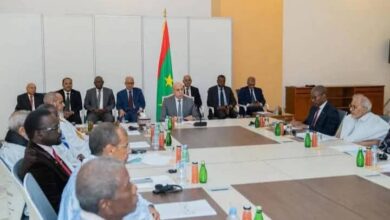When the Government Contracts with Itself

In Mauritania today, conflict of interest is no longer a mere occasional mishap in appointments—it has evolved into a deeply entrenched system, a mechanism for reproducing a ruling elite that controls the levers of power. The current government, which has long brandished slogans of transparency and anti-corruption, reveals more each day that corruption is no longer managed from the shadows, but from within ministerial offices themselves—through stamped and signed official decisions.
The Latest Scandal: The Ministry of Digitalization Contracts with the Minister’s Own Company!
In a troubling development, reliable sources have revealed that “IbtiKar”, a company specializing in digital solutions, has secured government contracts worth billions of ouguiyas from the Ministry of Digitalization. The minister currently leading this ministry, Ahmed Salem Ould Abed, is one of the company’s founders and key shareholders!
The circle of mutual interests doesn’t stop there. Sources indicate that the former Minister of Digitalization, Mohamed Abdallahi Ould Loulé, is also a partner in the same company. This means the ministry has been contracting continuously with its past and current owners. What need remains for the idea of a “third party”?
A Government of Shared Interests: From Digitalization to Self-Empowerment
This incident highlights how ministers are selected not for their competence or impartiality, but for their proximity to centers of economic and political power, or for their ability to push contracts through ministries in favor of their own companies, families, or tribal circles.
And this is not limited to the Ministry of Digitalization. We’ve seen it before:
Contractors becoming Ministers of Housing, only to award projects to firms linked to them—either from the past or in preparation for the future.
Businessmen appointed to economic ministries, with tenders managed under their watch as if they were political war spoils.
Officials placed in charge of internationally funded projects—such as those backed by the World Bank—appointing their relatives and associates using forged documents or files tailor-made for favoritism.
The Absence of the State… and the Reign of the Network
What the “IbtiKar” scandal reveals is that the state—as a neutral institution governed by law—is virtually absent. In its place stands the logic of “the group,” “the network,” and “kinship.” Ministers are not held accountable, but instead use their positions to settle old partnership dues or invest their influence for political or financial gain.
What’s Left of the Government’s Credibility?
In such a reality, there’s no meaning to the Transparency Commission, the Court of Auditors, or any electoral slogan about separating wealth from power or linking responsibility to accountability.
Worse than financial corruption is systemic political corruption—when institutions become tools for personal enrichment, killing any hope for meaningful reform.
Conclusion
Anyone observing today’s government performance realizes that the real battle in Mauritania isn’t between “government and opposition,” but between those striving for a modern national state ruled by law—and those clinging to a greedy state run by tribal alliances and backroom deals.
The IbtiKar scandal is not an anomaly. It is a mirror reflecting a government that has chosen to govern through self-exemption from accountability.
If this isn’t reason enough for dismissal and prosecution, it should at least serve as a political wake-up call to anyone who still believes this country can have a future beyond this vicious circle.









